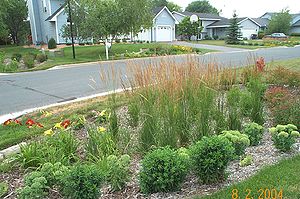
Difference between revisions of "Category:Level 3 - General information, reference, tables, images, and archives/Images/Bioretention photos"
m |
m |
||
| Line 7: | Line 7: | ||
This page (Category) provides links to photos for bioretention practices. | This page (Category) provides links to photos for bioretention practices. | ||
| + | |||
| + | {{alert|To determine what page the photo can be found on, click on an image to open the page, then in the left toolbar click on '''What links here'''.|alert-info}} | ||
[[Category:Level 2 - General information, reference, tables, images, and archives/Images]] | [[Category:Level 2 - General information, reference, tables, images, and archives/Images]] | ||
[[Category:Level 3 - Best management practices/Structural practices/Bioretention]] | [[Category:Level 3 - Best management practices/Structural practices/Bioretention]] | ||
[[Category:Level 3 - General information, reference, tables, images, and archives/Images/Best management practice photos]] | [[Category:Level 3 - General information, reference, tables, images, and archives/Images/Best management practice photos]] | ||
Latest revision as of 12:03, 8 February 2023
Information: A rain garden, a term familiar to the general public, is a bioretention practice.
Bioretention practice is a terrestrial-based (up-land as opposed to wetland) water quality and water quantity control process. Bioretention employs a simplistic, site-integrated design that provides opportunity for runoff infiltration, filtration, storage, and water uptake by vegetation. Bioretention is an important green stormwater infrastructure practice.
This page (Category) provides links to photos for bioretention practices.
Information: To determine what page the photo can be found on, click on an image to open the page, then in the left toolbar click on What links here.
Media in category "Level 3 - General information, reference, tables, images, and archives/Images/Bioretention photos"
The following 26 files are in this category, out of 26 total.
- Arboretum curb cut.jpg 640 × 480; 137 KB
- Arboretum rain garden 1.jpg 640 × 480; 109 KB
- Bioretention and ppavement.jpg 1,313 × 1,970; 999 KB
- Bioretention facility in St Paul MN.PNG 602 × 393; 700 KB
- Bioretention filled.png 532 × 401; 647 KB
- Bioretention media.png 1,026 × 773; 2.27 MB
- Bioretention photo 1.jpg 768 × 575; 92 KB
- Burnsville figure 2.png 587 × 386; 647 KB
- Burnsville rain garden 1.png 324 × 197; 165 KB
- Burnsville rain garden 2.jpg 1,425 × 946; 281 KB
- Burnsville rain garden before after.jpg 1,287 × 337; 97 KB
- CVS Pharmacy bioinfiltration basin.png 1,295 × 829; 1.67 MB
- Finished basin with simple groupings of shrubs grasses and trees.png 1,428 × 1,069; 4.07 MB
- Hb fuller.jpg 1,280 × 1,024; 929 KB
- Infiltration trench Lino Lakes.jpg 1,024 × 768; 821 KB
- Island rain garden.png 340 × 254; 221 KB
- Native landscaping.jpg 1,173 × 798; 959 KB
- Rake technique for bioretention.png 460 × 575; 679 KB
- RG pic1.jpg 800 × 600; 109 KB
- Screen before rain garden 2.jpg 1,000 × 750; 455 KB
- Stillwater rain garden 1.JPG 1,600 × 1,200; 1.9 MB
- Stillwater rain garden 2.JPG 1,600 × 1,200; 1.65 MB
- Winona 1.jpg 640 × 480; 150 KB
- Winona 2.jpg 640 × 480; 121 KB
- Winona 3.jpg 640 × 480; 189 KB
- Winona 4.jpg 640 × 480; 159 KB
This page was last edited on 8 February 2023, at 12:03.


























